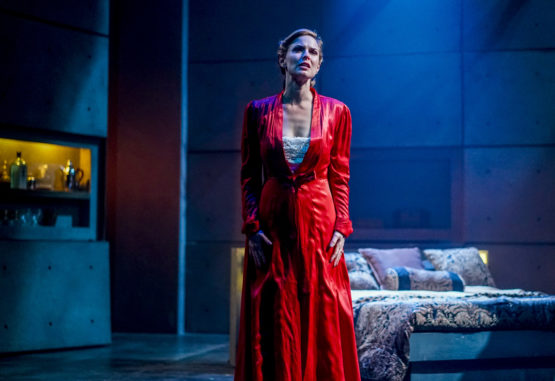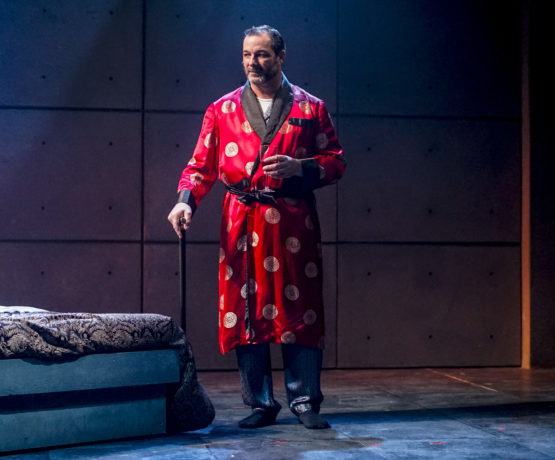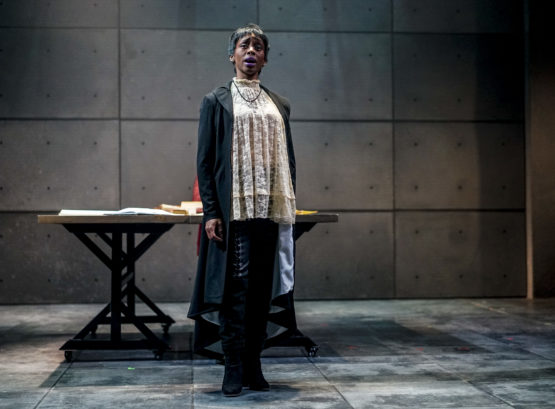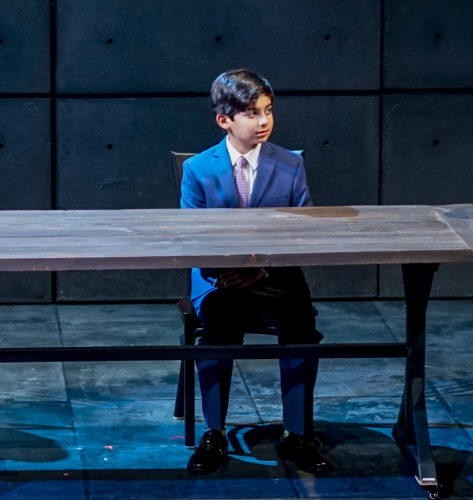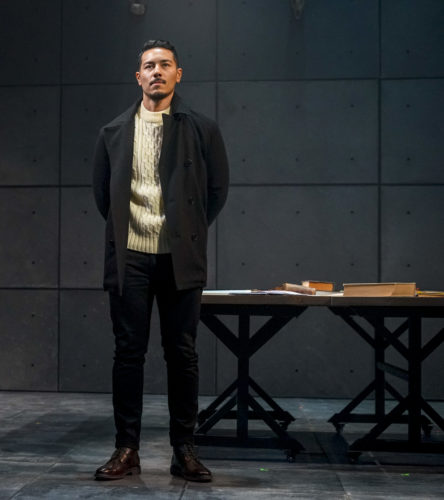Q&A with The Cast of The Last Wife
This contemporary re-imagining of the compelling relationship between Henry VIII and his last wife, Katherine Parr, is a witty and powerful examination of sexual politics and women’s rights.
We asked The Last Wife cast about this wonderful play. Here is what they said:
Why do you feel this play is relevant today?
It’s a play that has many layers. Not just about the struggles that women have dealt with for centuries, but how people use power to control and manipulate.
What drew you to this script?
Katherine Parr was an unknown hero. She changed the course of history for all women. I wanted to play that woman. I wanted to live in her daily life filled with danger, struggles, and successes. What better way to do that, than peel Parr open with The Last Wife!
Why do you feel this play is relevant today?
In today’s sexual/political climate it is extremely relevant, maybe more so than it was just a couple of years ago when it was written. It’s an example of the seemingly endless struggle women have had in gaining what should be their natural rights of equality and respect.
What drew you to this script?
I was drawn by the strong writing and the chance to dive into this complex character. During his reign, Henry seemed to be both feared and beloved. A man who was a reluctant King and yet not afraid to exercise his authority.
Why do you feel this play is relevant today?
This play is relevant because there is a dire need for discussion about gender equality and patriarchal privilege.
What drew you to this script?
I was drawn to the script because I love exploring history in an accessible, contemporary, and dramatic manner. History usually never interests me unless it is told in a way that doesn’t feel static or irrelevant. This play is not only relevant but deeply necessary in this current political climate.
Why do you feel this play is relevant today?
I like this show because it is about strong women. I think men try to control what place women have where they work and in politics and pretty much everywhere and it has happened throughout history. I also think this play shows how families can change and look different. It is not about just a mom and dad and their kids, there are other people who come into their lives and change how the family works.
What drew you to this script?
I didn’t read the script before I auditioned. The part of Eddie is a bit sad because his mom died and he now has a new mom, a dad who doesn’t spend a lot of time with him, and he is just a kid who doesn’t have any control of the things that are happening in his life even though he is stuck in the middle.
Why do you feel this play is relevant today?
The personal and social issues still resonate, and the danger and intrigue is exciting.
What drew you to this script?
Who wouldn’t want to be a prince?!
Why do you feel this play is relevant today?
It seems as though every day we learn of a new person-in-power stepping down from allegations of sexual misconduct, misogyny, inappropriate behavior, to name a few. With the head of our country also steeped in such charges, now more than ever, a story about women living surrounded by such men is more poignant than ever. But even more important, a story about strong women who fought through the noise and risked death for what they believed in, in order to advance women even if it wasn’t in their lifetime, is such an important part of history to know and hopefully inspire all people in our current climate to fight for what they believe is right.
What drew you to this script?
The point of view of the story. I’ve known the story of Henry VIII through various studies of the classics and history, but never have I learned much about the women who endured him. Especially never about his last wife and all the incredible things she accomplished as a woman in those times, not just as the kings wife, but as a person in general. Plus, it’s expressed beautifully with great dialogue and complex characters. Really humanized these people, which is attractive to an artist like me when considering a project.
Get your tickets today! The Last Wife closes on February 11th.
Very Superstitious!
With the spirit of Halloween & Dia de los Muertos coming up this weekend, Cygnet would like to share some superstitions to be mindful of during your next visit to the theatre.
1. Hauntings: Ghosts haunt theatres and should be given one night a week alone on the stage.
To keep the ghosts of the theatre subdued, there should be at least one night a week where the theatre is empty, this night is traditionally a Monday night, conveniently giving actors a day off after weekend performances.
At Cygnet Theatre, Monday and Tuesday are when the theatre is dark, so Charlie, our resident ghost, gets an additional day to haunt the theatre. Lucky him!
2. Ghost Light: There should always be a light burning in an empty theatre to ward off ghosts.
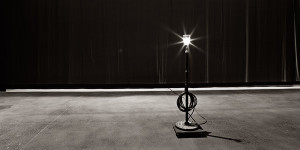 Conventionally, the light is placed downstage center, illuminating the space when it is not in use. This is to give ghosts like Cygnet’s Charlie enough light so that he can see, which keeps him at bay.
Conventionally, the light is placed downstage center, illuminating the space when it is not in use. This is to give ghosts like Cygnet’s Charlie enough light so that he can see, which keeps him at bay.
Another practical reason for a ghost light is the backstage area of a theatre tends to be cluttered with props and set pieces, thus someone who enters a completely darkened space is prone to being injured while hunting for a light switch.
It prevents the living from having to cut across the stage in the dark, hurting themselves and contributing to new ghosts for the theatre. It’s also known as the “Equity Light” or “Equity Lamp”.
3. Whistling: It is considered bad luck to whistle on or off stage, as someone (not always the whistler) will be injured.
Before the invention of walkie-talkies or “comms”, the cues for the theatre technicians (usually hired sailors) were coded whistles given by the stage manager. If one was whistling backstage it could call a cue before it’s due, which could have disastrous outcomes.
4. Saying Good Luck: To wish someone ‘Good luck’ before a show is bad luck.
It is considered bad luck to wish someone “good luck” in a theatre; the expression “break a leg” replaces this phrase. There are many theories on the origin of the term “Break a Leg”. The most popular? In the days of Vaudeville, companies would book more performers than could possibly make it onstage, but would only pay those who performed. Since the Renaissance, stage curtain legs have been used as part of the masking in proscenium theaters, which remain the most popular style of theater to this day. Thus, to make it on stage, one had to enter the line of sight of the audience or “break a leg”, to be paid.
5. The Scottish Play: Saying the word ‘Macbeth’ inside a theatre will result in extreme bad luck.
Theatre folk avoid saying the name of this play and only refer to it as ‘The Scottish Play’. If the name is spoken in a theatre, there is a cleansing ritual one can perform to rectify the mistake. The most popular way: the offender is required to leave the theatre building, spit, curse and spin around three times, before begging to be allowed back inside. Other variants include: Reciting a line from another Shakespearean work, brushing oneself off, running around the theatre counter clock-wise, or repeating the name 3 times while tapping their left shoulder.
There are several possible origins for this superstition. One of the most commonly held beliefs is due to the play’s infamous reputation as theatres in debt often produced it and it was used as a last attempt to increase sales, but the theatres normally went bankrupt shortly afterwards.
Other superstitious activities to avoid in the theatre:
- It is considered bad luck to give flowers to actors BEFORE the show.
- It is also bad luck to complete a performance of a play without an audience, hence the practice of “invited dress” allowing family & friends to attend the final dress rehearsal. Another way around this is to avoid saying the last line of a play.
- A company should not practice doing their bows until the final dress rehearsal.
- Peacock feathers should never be brought on stage. Actors associate this accessory with disasters on stage.
- Stemming from a concern over theft, real money and real jewelry shouldn’t be used on stage.
- A bad dress rehearsal means you will have a great opening night.
Speaking of ghosts, catch three very well known ghosts this holiday season with Cygnet’s new original musical, A Christmas Carol. Perfect for the whole family!
